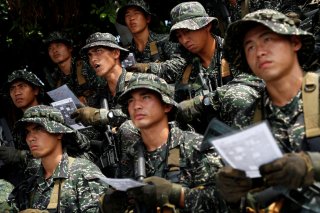Is Defending Taiwan Worth It for America?
America needs to weigh its informal alliance and what it is willing to spend to defend Taiwan in a real war. The costs are high, but are they justified?
Succoring free peoples is an idea that resonates in American society, but Taiwanese must not kid themselves. Washington will not automatically honor its informal security commitment to Taiwan. Like Britain at the outset of World War II, Taiwan must show itself to be a worthy and affordable cause. For its part, Beijing will try to depreciate Taiwan’s value to Americans while convincing them they will have to pay BMW prices for a clunker—if they can afford the sticker price at all. Xi will try to turn Clausewitzian cost/benefit logic to strategic advantage. A fair number of doomsayers here in the West seem receptive to such messaging, writing off the island as not worth the effort or expense.
How will Washington come down in the cross-strait standoff? There are hopeful signs. The latest: recently the War Zone carried a story about soldiers from the U.S. Army’s 1st Special Forces Group, the famous Green Berets, training with their counterparts on Taiwan. Releasing such footage is rare. It signals to influential audiences, including Taipei and Beijing, that the U.S. leadership does believe Taiwan is a worthy cause and is prepared to come to its aid in times of strife. It signals that Washington has skin in the game of Taiwan’s independence and will be there for the islanders should war come. Putting American lives in harm’s way is as firm a commitment as there is. It could deter Beijing. And disclosing Green Beret operations signals that the U.S. and Taiwanese armed forces work together on practical matters. Armed forces fight the way they train. If two partners train together regularly, they’re apt to fight as one.
Will it be easy to defend Taiwan? No. But John F. Kennedy delivered a speech at Rice University in 1962 in which he asked rhetorically, “why does Rice play Texas?” (He was referring to the gridiron mismatch between the Texas universities.) JFK proclaimed that societies—whether it’s the beleaguered Rice football program or the American people—attempt great feats “not because they are easy, but because they are hard.”
Let’s get on with it.
James Holmes is J. C. Wylie Chair of Maritime Strategy at the Naval War College and author of “Visualize Chinese Sea Power,” in the current issue of the Naval Institute Proceedings. The views voiced here are his alone.
This article first appeared earlier this year and is reprinted due to reader interest.
Image: Reuters.

